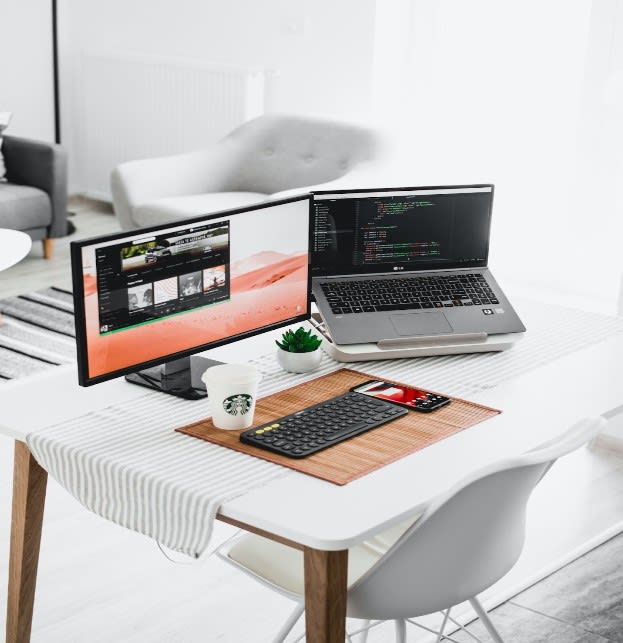How to maximize productivity as a freelancer?
Here are some of our best tips on how you can maximize your productivity as a freelancer

70% of freelancers report working on as many as 4 projects at a time. Sounds familiar?
If you are juggling multiple projects and struggling to meet those deadlines, this article is for you.
There are many reasons why staying productive is challenging. It could be that you’re overworked, lack the resources or space conducive to work, or simply struggle to stay organized because you’re relying solely on motivation.
The good news? Whatever the challenge may be, there are a few simple techniques that can help you improve productivity without sacrificing quality.
Here are some of our best tips on how you can maximize your productivity as a freelancer:

1. Create to-do lists and schedules
Have you ever found it challenging to start a new task, but once you get going the ideas keep piling up and everything becomes easier almost immediately?
There's a way to make starting things easier without having to rely solely on motivation.
It is called a “to-do list”.
Our minds love order. Organizing your tasks in to-do lists can take your focus away from the anxiety of planning a new project by giving you structure and a plan to follow.
Having a visual representation of your action plan can work wonders for your productivity! So, be creative (and consistent!) with how you want to present your to-do lists. You could use sticky notes, phone apps, even Word document - give a couple of options and formats a try to find the comfortable solution for you!
We enjoy using tools like Google Calendar to stay organized. Calendars are a great way to track your daily assignments and make sure that you stick to the schedule while fitting it into your overall daily routine.
These tools also allow you to share your schedule with others, so they can know when your availability.
What's even better than bringing structure to your work is the feeling of reward that comes with ticking the tasks off your to-do list.
2. Set boundaries. Know your capacity.
Taking on more projects than you can handle may bring short-term profits, but they are very likely to affect your productivity, the quality of your work and your client relationships. That’s why we always advise freelancers against multitasking.
Try to be realistic when assessing how much work you can take on. This is, of course, easier said than done. It does require experience to figure out what your limits are, but above all, it starts with being honest with yourself. It is always better to under-promise than fail to meet expectations.
One practical tip would be to track your tasks to see how long they take. You can do this manually or by using project management tools.
Pro tip: Add an extra hour to your estimates as a buffer.
3.Prioritize the hardest tasks
The hardest tasks are the easiest to put off and, if you’re struggling with productivity, procrastination is your worst enemy.
So, flip the script!
Tackle the most challenging projects first and keep the easy ones – or the ones you enjoy the most – as an end-of-day treat.
There’s science behind this, as a matter of fact.
Studies have shown that you're most productive when you start work and your productivity declines from there. Starting with the difficult tasks allows you to deploy most of your resources to the difficult tasks.
4. Pace yourself and take breaks
Yes, scheduling your workload and managing your time efficiently is important. However, what's even more important is pacing yourself to avoid burnout.
In other words: take breaks. Preferably, active breaks.
Make a conscious effort to drink water, eat on time, stretch regularly, go for a walk - these small practices can do wonders for your energy levels.
Try to perform these activities away from your workspace or else you might be tempted to work while you are supposed to rest which defeats the purpose.
5. Learn when to say "no" to a project
First of all, let's get this out of the way: we know that not everyone has the luxury to say "no" to a project. Especially if you're just starting out.
However, learning to say "no" to opportunities you do not have physical or menta capacity to handle is an integral part of learning how to stay efficient while producing high-quality work.
The easiest way to do this is to prioritize acquiring the projects you are passionate about.
That all sounds well and good, but how do you find such opportunities?
Well, for one, you can take a look at some of the best staffing companies, including goLance, we've compiled for you and see whether they have job openings for your ideal passion projects.
6. Be consistent
So, you've created an ordered task list and a schedule to follow. You’ve prioritized the most difficult work to avoid procrastination. You’ve worked the “me-time” into your schedule. No how do you keep the momentum going?
The simplest answer is: It takes practice and it takes patience.
A psychology study has shown that it takes us around 66 days to form a new habit. You are likely to feel the urge to deviate from your schedule or give up from the new routine entirely but remind yourself then and there that this is your mind’s natural tendency and that you can overcome it.
Once you do, keeping on track gets easier and the payoff is long-term.
7. Reflect on your progress and take pride in your work
When you’re too focused on ticking off the tasks, you lose sight of the progress you have made.
Much like making a conscious effort to keep yourself hydrated, nourished and rested, make a conscious effort to regularly reflect on your work and recognize the improvements in your productivity.
And, if you're content with the quality of the work that you've produced, don't shy away from rewarding yourself. Rewards help us reinforce desired behavior and turn it into a habit. At the end of the day, that’s the name of the productivity hacking game: Developing new, sustainable habits that transform work from a daunting bag of tasks into a rewarding daily experience.

